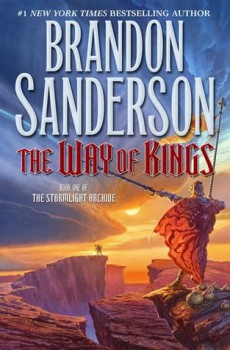Charlene Brusso Reviews The Way of Kings
 The Way of Kings
The Way of Kings
Brandon Sanderson
Tor (1280 pp, $8.99, May 2011 mass market)
Reviewed by Charlene Brusso
When does the end justify the means? That is the overarching question posed in the first volume of Sanderson’s new series. It’s a tough one, and an excellent choice for exploration within an epic fantasy framework. Working on the Wheel of Time series has made Sanderson’s writing longer, but thankfully it hasn’t dulled his skill at worldbuilding, or his masterful ability to create vivid characters caught up in challenging situations.
The Way of Kings is an ancient text which discusses how to protect a nation and govern honorably. Most of its teachings, however, are poorly regarded – in fact, outright heretical – by the powerful Vorin church in contemporary Roshar, some 4500 years after it was written. The text comes from the time of the lost Radiants, noble warriors whose mighty Shardblades gave them powers beyond normal men. But the Radiants disbanded, abandoning their responsibilities, and none now knows the truth of those times. And so the text has fallen into disfavor.
Millennia later, the current king, Elhokar, has his hands full fighting off Parshendi incursions, and no time or interest in reading heretical philosophy. His father’s assassination left him in control of a vast kingdom under siege, and he is determined to do whatever he must to hold it together. The last thing he needs is to lose his top commander and most trusted advisor, his uncle Dalinar, to insanity.
Dalinar is doing his best to keep his “visions” secret, but something is talking to him, and he has no idea what it is. Worse yet, what it says seems to make sense – even though it parallels the teaching in the disregarded Way of Kings. Can he trust the voices in his head? And if they are right, how does he convince his nephew to listen?
Meanwhile young Shallan Davar has sought out Jasnah Kholin, the king’s sister, a Brightness, or priestess and scholar of the Vorin church and one of the most infamous and powerful women in the world, on a questionable mission of her own. She must steal Jasnah’s Soulcaster, a magical gemstone which can transform one element to another, to save her family from ruin. But once provisionally accepted as a student by Jasnah, Shallan is torn between her duty to her family, and the world of learning Jasnah has opened for her.
Sanderson’s third main point-of-view character is Kaladin, a student healer turned skilled soldier and commander, betrayed by a leader who slaughters his fellow soldiers and sells Kaladin into slavery. Kaladin is sent to work as one of the bridgemen who must carry heavy wooden bridge sections ahead of the King’s army to allow soldiers to cross the rugged terrain where they battle the enemy. The truth of the matter, however, is that the enslaved bridge crews are little more than arrow fodder for Parshendi archers, drawing fire away from the trained soldiers. Determined to survive, along with the rest of the men of the Bridge Four crew, Kaladin undertakes the task of training them and inadvertently finds himself once again accepting the responsibility of commanding – and caring about – a group of soldiers who trust him.
Sanderson populates his world with other characters as well, whose importance is likely to wax and wane as the series progresses: Szeth the Truthless, an assassin and slave, with no legal responsibility for the crimes he is ordered to commit; Wit, Elhokar’s fool, who in the best tradition, is free to challenge the king and say what no one else dares to say; Sylphrena, a spren or spirit who is much more than anyone expects, among others.
As usual, Sanderson gives us a unique and intriguing magical system with its origins bound in an ancient and dark past. The Way of Kings overshadows the story, as each character is confronted with moral and ethical choices and must decide which route to take. Dalinar’s voices tell him, “Act with honor, and honor will aid you.” But Kaladin knows firsthand that the person you trust the most may often be the one most likely to betray you.
Does the book need to be as long as it is (and by extrapolation, the series?)? No, not by any means. The interwoven stories here are each dense enough to be their own novels, or parts of them. On the other hand, Sanderson doesn’t repeat himself, and there is no sloppiness here. He uses the greater length to take us deeper into each character, and to reveal more about the world. While that may not be necessary from a strictly story-telling sense, it does provide a satisfying journey – at least, so far.
For it is written in the Way of Kings itself: “We are not creatures of destinations. It is the journey that shapes us.”
__________
A slightly different version of this review originally appeared in Black Gate Magazine #15
Charlene Brusso is a science fiction & fantasy author and science writer. She also reviews science and genre fiction for several venues, from Ad Astra and Black Gate to the NY Journal of Books and the SF Site.
[…] A year later, Sanderson released the 861-page Wheel of Time novel Towers of Midnight, written from Robert Jordan’s notes. The same year (!), his massive 1,008-page novel The Way of Kings won the 2011 David Gemmell Legend Award (our review is here.) […]